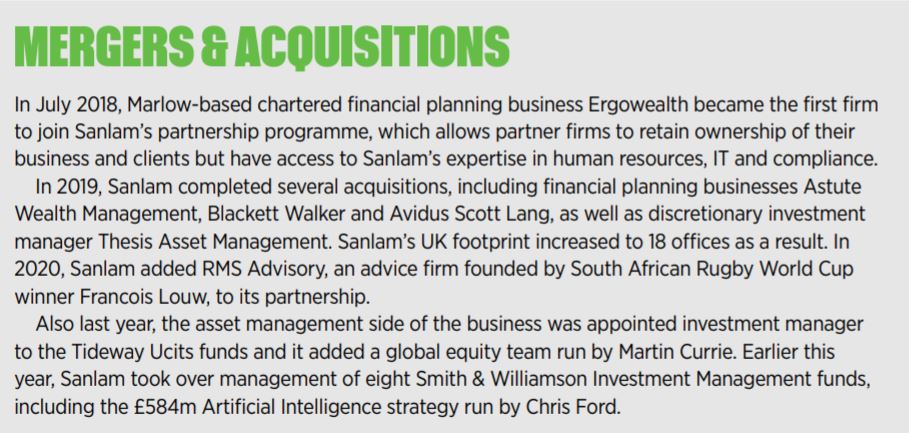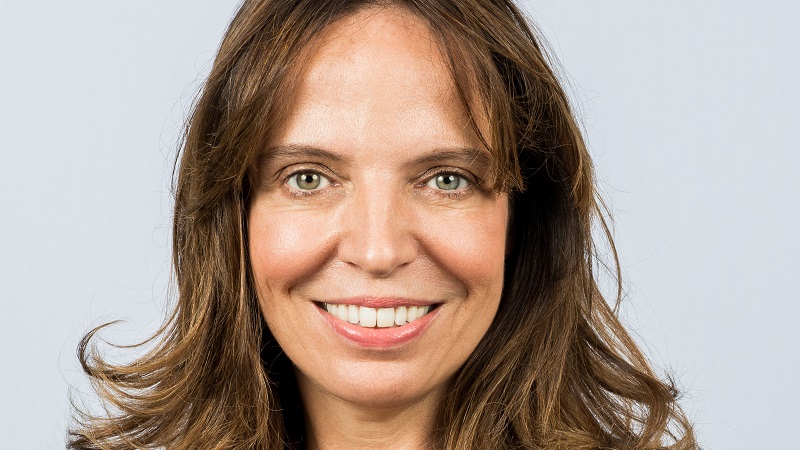Sanlam Private Wealth chief executive Penny Lovell views the past 18 months as a period of “complete transformation” for the wealth management firm as an innovative use of digital interaction with clients helped cement relationships and win new business.
“Lockdown, for all of its challenges, forced us to think outside of the box and revolutionise our entire client approach, and actually it’s helped to strengthen our relationship with clients in many ways,” she says.
And Lovell, who joined Sanlam’s executive committee in 2017 from Close Brothers Asset Management, where she was head of private clients marketing and distribution, estimates Sanlam staff now speak with clients about four times more often than before lockdown.
As market volatility ramped up last March, the firm put in place a programme of digital events for clients, including investment seminars, as might be expected, but also those targeting health and wellbeing as well as social events.
“We asked: how can we support clients, distract them from some of the challenges and bring some happiness, as well as making them feel secure that we’re looking after their wealth in a sensible way?”
The programme included mobility and exercise classes, a pub quiz, masterclasses in self-portrait painting with artist Eileen Cooper, cooking with Masterchef semi-finalist Christian Day and virtual cocktail mixing under the guidance of Joyce and Raissa de Haas, the owners of mixer brand Double Dutch.
“I’ve never had so many clients want to come to an event,” says Lovell. The online fitness class has been a particular hit. Lovell explains how 50 or so clients took part in the first session and to her disbelief and joy, they continue to meet every week.
“This is couples and individuals from Aberdeen to Land’s End, who every week do their exercise together and that is magic,” she says. “What was actually created were friendships. I’ve never known clients to become such strong friends.”
The human perspective
As well as generating friendships among its client base, these digital sessions are a boon for Sanlam from a commercial perspective because when clients get together, they spend time discussing their finances, from pensions to tax to investments.
“From a very human perspective, people were getting their finances into order from an exercise class,” says Lovell. She adds: “Never has it been truer, and never has an experience showed me more, that if you do right by your clients, if you look after them, talk to them, understand them, your business grows.”
Sanlam also ran an online work experience programme for relatives of clients aged 18 to 21 for which senior managers gave tutorials and lectures covering topics from marketing and wealth planning, to starting a career in financial services. Participants even took part in a Dragons’ Den-style project for which they had to give a presentation to a panel of experts.
Lovell says rather than the usual 30 placements, the firm has had about 170 young people take part. According to Lovell, this helped Sanlam in thinking about how it works better with the next generation.
“I think that’s been a criticism of the wealth management industry of how well we do that. We ended up running three programmes over the past year,” she says.
Sanlam also used its experience in digital events to help IFA clients with their own programmes for clients. “We started this whole spider’s web of using our collateral to help other businesses.”
And as the economy starts to re-open and business is conducted more on a face-to-face basis, Lovell is keen to run these programmes as hybrid events with some logging on through Zoom and some attending in person for lunch.
“I don’t want to be a slave to anything but what works in that particular moment for our clients and introducers,” she says.
Responsive message
Sanlam’s inventive approach seems to be paying off. Around the start of the pandemic, it drafted in financial consultancy and marketing agency Wisdom Council to conduct research among its client base to help it target its services. According to Lovell, the research found 87% of clients had an improved perception of Sanlam as a firm and how it looks after its relationships.
Winning new business during the pandemic without in-person contact has been a challenge for most wealth managers, so how has Sanlam fared in this regard? Lovell says a lot of clients have referred friends and family, partly through the digital events.
“As a team of portfolio managers and financial planners, we’ve all become a lot more responsive. We’re getting more client referrals from existing clients than ever before.”
Lovell also says Sanlam has reconnected with existing clients as the result of an ongoing initiative, started in March last year, to move all clients with pots of less than £350,000 from bespoke solutions into its multi-asset funds. The primary driver for this was the fact that looking after many smaller bespoke portfolios was resource intensive and expensive for some clients. Being in a multi-asset strategy can also offer much better diversification.
Almost half (45%) of those clients have been moved to the multi-asset fund, but Lovell stresses while it has been a massive undertaking, it has been conducted in a “painstaking” and client-centric way. The firm uses a “buddy system”, which links financial planners with portfolio managers so the process can be explained clearly to clients from different perspectives.
In most cases, a transfer into multi-asset is the right thing to do, explains Lovell. She adds: “It’s been amazing, the number of clients we have discovered who weren’t thinking about their pension properly, had not done their ISAs or thought about their inheritance tax, or are paying too much for life assurance.
“We’ve had a really successful year – this has been a good growth period for us.”
Sanlam UK has been busy acquiring firms or teams during the past couple of years, mostly on the asset management side (see box-out below), but how does Lovell view M&A activity developing from here? She describes M&A as “almost a necessity” in today’s environment, partly because of the rising costs of regulation and partly due to the continued erosion of margin, as companies compete in a more transparent and fairer environment.
“It is a central plank of our strategy to grow,” she adds In terms of keeping staff incentivised to stay with Sanlam in such a competitive environment, Lovell says this is not purely down to rewarding staff financially. She draws on a quote from basketball legend Michael Jordan to summarise her outlook: “Talent wins games, but teamwork and intelligence win championships.
“I think that’s so relevant to what we’ve been doing at Sanlam, because we have the digital events for clients but actually we’ve been working really closely together as a team of people.
“And that means every morning we come together and have a ‘school assembly’, and I know every single person who’s on that call and how they are feeling.
“Retaining staff is about doing what’s best for your people. This was a really difficult environment and we needed to show them we cared and were supportive.”
She adds: “I think when you’ve got a really strong team of people who genuinely care, you start finding you do retain your staff because together we all know we are building something and we’re getting good momentum.”

Looking ahead, Lovell says the focus will continue to be on moving relevant clients into multi-assets. Attention will also be given to communicating the firm’s ethical and ESG portfolios to the market, in particular the message that investing responsibly does not have a negative impact on returns. This process is underway and in recent weeks the firm put together a series of articles on sustainable investing.
“The performance remains strong,” says Lovell, “it’s just that we’re not talking about it enough, that’s all.”
For a firm that has prided itself during lockdown on its innovative use of communication to engage with clients, there seems no reason its ESG campaign won’t be equally successful.
This article is from the July/August 2021 issue of Portfolio Adviser magazine. Read more here.










